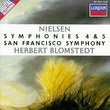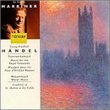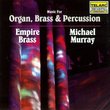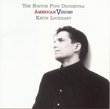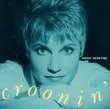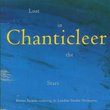| All Artists: John Rutter, Timothy Brown, City of London Sinfonia, Nicholas Collon, Nicholas Rimmer, Elin Manahan Thomas Title: Rutter: Requiem Members Wishing: 0 Total Copies: 0 Label: Naxos Release Date: 4/29/2003 Genres: Special Interest, Classical Styles: Holiday & Wedding, Opera & Classical Vocal, Historical Periods, Early Music, Modern, 20th, & 21st Century Number of Discs: 1 SwapaCD Credits: 1 UPC: 747313213023 |
Search - John Rutter, Timothy Brown, City of London Sinfonia :: Rutter: Requiem
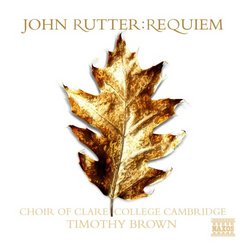 | John Rutter, Timothy Brown, City of London Sinfonia Rutter: Requiem Genres: Special Interest, Classical
Produced by the composer himself, this is the first recording of the original ensemble version of John Rutter?s radiant Requiem. Written in 1985, the work is not a conventional setting of the Requiem Mass but comprises a p... more » |
Larger Image |
CD DetailsSynopsis
Album Description Produced by the composer himself, this is the first recording of the original ensemble version of John Rutter?s radiant Requiem. Written in 1985, the work is not a conventional setting of the Requiem Mass but comprises a personal selection of texts from the Catholic liturgy and the 1662 Book of Common Prayer. John Rutter maintains intimate ties with Clare College and many of his anthems are left as a musical legacy to the college. Among these are two simple, tender Blessings: Go forth into the world in peace, dedicated to the choir on the eve of its first tour to America; and A Clare Benediction, written as a gift to Rutter?s alma mater. This recording is dedicated to the memory of Christopher Rutter. Similarly Requested CDs
|
CD ReviewsLovely from Start to Finish J Scott Morrison | Middlebury VT, USA | 04/29/2003 (5 out of 5 stars) "Anyone who has ever sung the Rutter `Requiem' gets it in their bones, and it stays there. This may not be the most profound Requiem ever composed, but it is certainly one of the most beautiful. There is a sort of symmetry with the appearance of this performance of the Requiem on Naxos. First, it is the version, available from the time of its original composition but never before recorded, for reduced forces; it uses organ and six instrumentalists (flute, oboe, cello, harp, timpani, percussion) as opposed to the more familiar version for medium-sized orchestra. Second, it is performed by musicians from Rutter's Cambridge alma mater, Clare College, where he read music as an undergraduate and where he was director of music in the late 1970s. And, finally, it has a certain resonance with what is probably Rutter's own most famous recording of music not his own, namely that of the Fauré Requiem. Rutter made an arrangement from the manuscript of the earlier 1893 version that Fauré made for reduced forces and he recorded that version for the first time. That recording changed our ideas about the Fauré; up to then we had known only the much larger version for full orchestra and chorus that he (or perhaps his student Roger-Ducasse) made for a performance in 1900. Rutter himself was producer of the present recording of his Requiem and therefore it obviously has his stamp of approval.A comparison with the 1986 recording Rutter made with the Cambridge Singers and the London Sinfonia shows that the present performance is more delicate, more serene, and with even clearer diction than the earlier version. The organ fills in much of what was previously played by the orchestra, and it is played sensitively and with suitable restraint here by Nicholas Rimmer, an organ scholar at Clare College, Cambridge. The Clare College choir, unlike other Cambridge college choirs, has female sopranos, not boy trebles. The soprano soloist is Elin Manahan Thomas, and she is superb; in the Lux aeterna she surpasses Rutter's soloist in the ethereal beauty of her final ascending solo line. The playing of the cellist, Sue Dorey, in the 'Out of the Deep' section is eloquent.The disc also contains two `Blessings for Choir and Organ' written specifically for Clare College: `Go forth into the world in peace' and `A Clare Benediction,' each achingly beautiful. It is touching to recall that Rutter's son Christopher sang these two pieces during the one year he was a singer in this choir, just before his death in a motor vehicle accident. Also included are an Advent anthem, `Arise, shine,' set to the words of Isaiah 60, `Come down, O Love divine' set to an English translation of a 13th-century Latin text, and most fittingly, `Musica Dei donum optimi,' (`Music, the gift of the supreme God') which extols the power of music to make `savage souls gentle' and uplift `sad minds,' a transcendently lovely setting for choir and solo flute. And finally, there are two pieces for organ alone, `Toccata in seven', a lively piece in 7/8 time and unusually, a duet for organ four-hands (and four-feet - talk about a traffic jam!) `Variations on an Easter Theme.' This disc is lovely from start to finish and is enthusiastically recommended to choristers, organists, choir directors and, most of all, music lovers of all stripes. Scott Morrison" Better than Rutter's Collegium label recording John O'Neill | Alpharetta, GA | 09/25/2003 (5 out of 5 stars) "In 1993 Naxos scored big with their recording of Faure's Requiem featuring the Schola Cantorum of Oxford and the Oxford Camerata under the direction of Jeremy Summerly. It was Faure's original "stripped-down" arrangement for smaller orchestral forces and it made both listeners and critics take notice. It continues to be one of the best versions - if not the best - out there. Now, 10 years later, Naxos does it again with a new recording of John Rutter's Requiem, a work partially inspired by Faure's Requiem. As on the Faure release, this arrangement, conceived at the same time as Rutter's full orchestral version, is for smaller forces, especially in the orchestra (just organ, harp, flute, oboe, cello, timpani, and percussion). To me it packs a greater emotional punch in this stripped down, more intimate version. The Choir of Clare College, an ensemble that has a long history with Rutter, performs beautifully and is perfectly balanced in the recording: this music sounds as though it is coming down from heaven. On the Pie Jesu and Lux Aeterna movements I found myself holding my breath so as not to miss one note from soprano Elin Manahan Thomas: she's that good. (The Pie Jesu is also a highlight of the Faure disc with soprano Lisa Beckley equally impressive.) The remaining seven items on the Rutter disc, if the Requiem isn't enough to win you over, are equally impressive with the Musica Dei donum for flute and choir providing another work of sublime beauty. The last two works on the disk are for solo organ and are world premier recordings. I actually prefer this Rutter produced disc to Rutter's Collegium label disc which couples the Requiem with the Magnificat. Get this disk! " A glorious piece FrKurt Messick | Bloomington, IN USA | 12/16/2005 (5 out of 5 stars) "--Music--
Rutter's Requiem was written in 1985. In Catholic liturgy, a requiem is a Mass for the Dead, and as such involves strong tones both of mourning and loss as well as elements of hope and eternal life as reflected in Christian belief. Rutter states that, like Brahms and Faure, there are elements that depart from the traditional lines of a Catholic requiem. Rutter takes some of the texts from the 1662 Book of Common Prayer. Both the first and second movements, Requiem aeternam and 'Out of the Deep', set very dark, low, sombre tones. The use of strings at the beginning of 'Out of the Deep' is very effective, together with funeral-dirge like vocals. This contrasts greatly with the Pie Jesu, light and spiritual. The Sanctus is almost playful in aspect, and the Agnus Dei and Lux aeterna draw the listener higher and higher into the fullness of expectation of God's presence. --John Rutter-- Rutter was born in London and educated at Clare College, Cambridge. This was where his career as a composer, arranger and conductor began. His early work was with groups at King's College Chapel at Cambridge as well as the Bath Choir and Philharmonic Orchestra. He has worked for the BBC providing music for educational series such as 'The Archaeology of the Bible Lands', until in 1979 he began forming the Cambridge Singers, and has continued a remarkable career of performance and recording as their director ever since. This recording is produced by Rutter, but is performed by the London Sinfonia, a group that he has worked with but is not the usual Cambridge Singers. This performance compares favourably with Rutter's own group, with areas in which there is greater subtlety and depth." |

 Track Listings (14) - Disc #1
Track Listings (14) - Disc #1